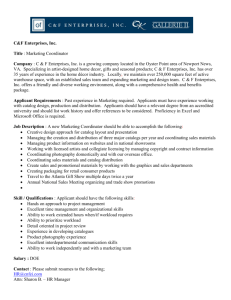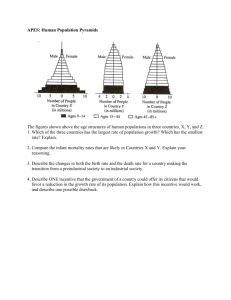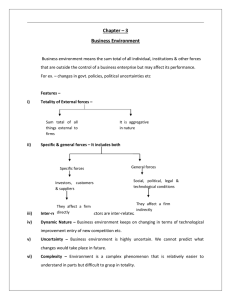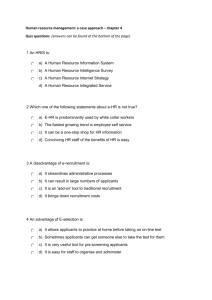South Africa
advertisement
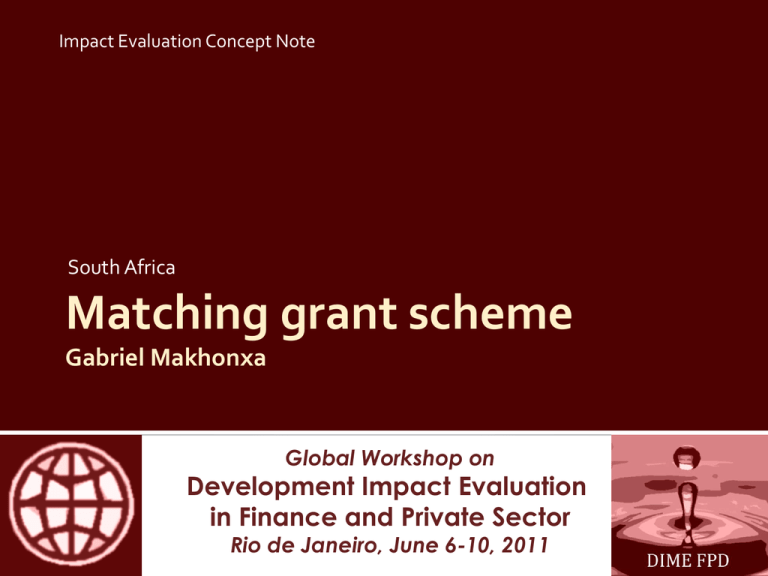
Impact Evaluation Concept Note South Africa Matching grant scheme Gabriel Makhonxa Global Workshop on Development Impact Evaluation in Finance and Private Sector Rio de Janeiro, June 6-10, 2011 Intervention Summary Black Business Supplier Development Programme (BBSDP) is matching grant scheme offered to black-owned small to medium enterprises in South Africa. The objective of BBSDP is to assist business to improve their competitiveness with the intention to bid successfully for tender opportunities created by both the private and the public sectors. The BBSDP to be evaluated is an upgraded version of a prior programme with the same name. Intervention Summary Eligible Enterprises (1) Black-owned businesses (50+1%) (2)Management team predominately black (3) Registered companies (4)Trading for at least a year (5)Turnover of R250 000 to R35 million ($37000 to $5 million) Intervention Summary Eligible Expenditure (1)Total amount you can apply for is R1 million ($143,000) (2) Cost-sharing of 50:50 for equipment/technology (3) Cost-sharing of 80:20 for Enterprise Support Services (training, software, ISO, business planning, etc) (4) Enterprises can apply for only 25% of its previous turnover Evaluation Questions How effective is BBSDP in enhancing the performance (productivity, sales, profits, employment) of black-owned small enterprises in South Africa? What is the return on investment of the program? Are the effects of BBSDP different across different groups (sector, gender of the owner, region)? Are the effects different between applying costsharing and full payment? (IE design later) Story so far Started engaging with World Bank about the impact evaluation of this matching grant from mid-2010. Program was soft-launched in late 2010 under more restrictive selection criteria. The submission for the final terms of the criteria of eligibility have been recently been approved by the Minister. Initial challenges: take-up POPULATION OF ALL BLACK BUSINESS SUPPLIERS FACTORS INFLUENCING APPLICATION Criteria: Initial criteria with minimum R 500 thousand annual turnover Criteria: Cost sharing (initially 50/50 for ESS) Impact evaluation: fear of not receiving grant (initial design involved randomization) Marketing: Promotion coordination problems NF training: Delayed accreditation Sampling and Data Comprehensive list of small businesses that are potentially eligible for BBSDP (30,000 businesses) Random assignment of 10 000 enterprises. Process of listing potentially eligible enterprises to be repeated every 9 months (except for initial sample(s)) Screening of enterprises in each window period and active promotion Promotion to include incentive with 1 in 5 chance of getting full payment Network Facilitators to assist interested businesses in applying for BBSDP After 9 months, compare outcome for 1st and 2nd group of applicants. Compare three targeted groups at endline. BEE: 16,000 firms Introye: 50,000 firms SAWEN: 1,000 firms Evaluation Design SEDA: 9,500 firms Desktop pre-screening for eligibility New Impact Evaluation Design Sample frame: 30,000 firms Updated every window Window 2 10,000 firms (9 months after) Window 3 10,000 firms (18 months after) TIA Screening and incentive promotion TIA Screening and incentive promotion TIA Screening and incentive promotion 600 w1 applicants 600 w2 applicants 600 w3 applicants Survey with recall to baseline Survey with recall to baseline w1 applicants w1 applicants w2 applicants w2 applicants Window 1 10,000 firms w3 applicants Develop and prescreen firm databases; structure screening and incentive guidelines for TIAs Train TIAs TIA offers to provide supporting documentation and NF support Firm Interested Y/N NO Retain list of all businesses contacted but not interested YES Provide contact details to designated NF for follow up PSC and application Provide TIAs with list of business contacts TIA outlines BBSDP in more detail to business and provides incentive to apply early** TIAs make contact with firms to verify eligibility* YES * Eligibility criteria questions: 1. Majority black ownership 2. Length of time business has been operating 3. Turnover 4. Simple PSC pre-checks to determine if firm is likely to pass the PSC Firm eligible Y/N NO Business recorded and marked off the list **Incentive: 1. Financial incentive: applicant has a 1 in 5 chance of receiving full cost borne by DTI rather than cost-sharing Timeline Activity Pre-pilot targeted marketing (400 contacts) Final lists of businesses and sampling Targeted marketing first window Targeted marketing 2nd window and midline survey Timing July 2011 August 2011 September 2011 June 2012 Midline impact evaluation report August 2012 Targeted marketing 3rd window and midline survey March 2013 Final impact evaluation report July 2013 Team and staffing Team Member Organisation Gabriel Makhonxa DTI Nonceba Mashalaba DTI Varsha Harinath DTI Madeleine Maree DTI Francisca Strauss DTI Francisco Campos WB Aidan Coville WB Ana Fernandes WB Sabrina Roshan WB Budget Team Member Organisation Targeted Marketing (I, II, III) $10,000 Midline survey $100,000 Endline survey $130,000 Field coordinator, travelling, other costs $50,000 Impact Evaluation Concept Note South Africa Matching grant scheme Gabriel Makhonxa Global Workshop on Development Impact Evaluation in Finance and Private Sector Rio de Janeiro, June 6-10, 2011
